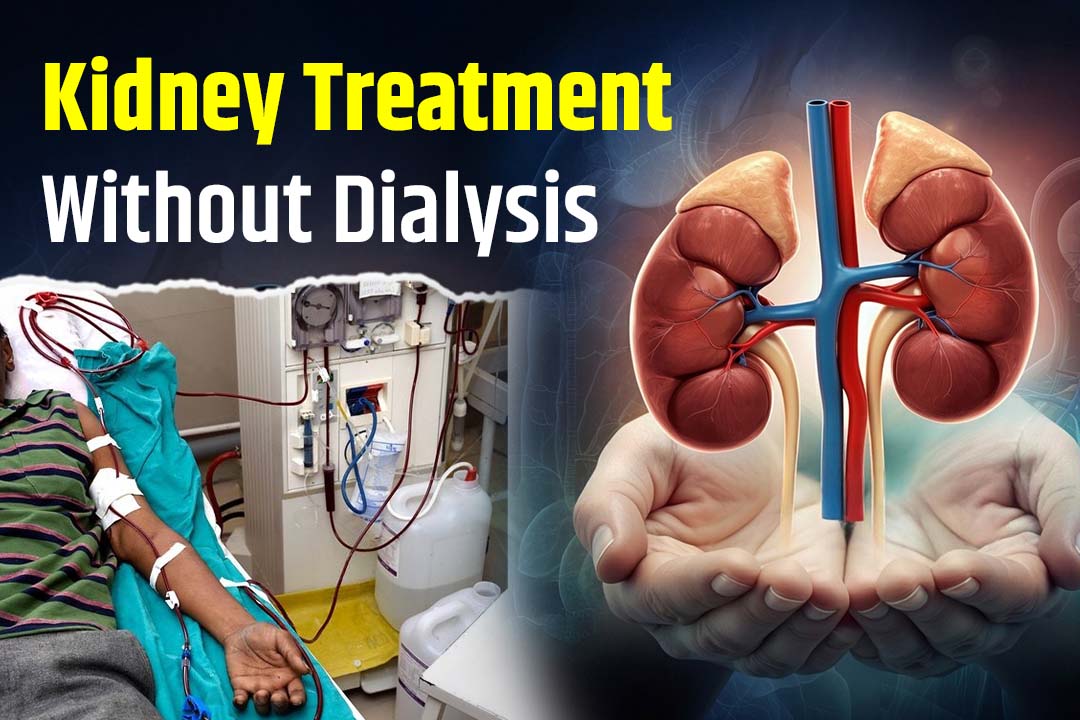
Kidney Treatment Without Dialysis: A Natural and Hopeful Approach
Let’s start with a bit of honesty: the word “dialysis” can be frightening. It brings to mind hospital visits, tubes, machines, and long sessions that tie a person to a medical chair. For anyone with chronic kidney disease, the thought of ending up on dialysis can feel like the end of the road. But here’s something important to remember: it’s not the only road.
Many people are managing their kidney treatment without dialysis and are slowing down the disease’s progression without dialysis. If you or your loved one is trying to avoid dialysis, know that you're not alone, and you do have options.
This blog isn’t here to offer false hope or miracle cures. But it is here to share real, practical, and natural ways to support your kidney health, especially if you're in the early or middle stages of CKD. Let's explore how to recover a damaged kidney? and give your kidneys the care they need, without rushing toward dialysis.
Understanding the Kidneys and CKD
Your kidneys are small but mighty organs. They filter your blood, remove waste, balance your fluids and electrolytes, and help control blood pressure. But when they start to lose their function (as in CKD), waste starts to build up in the body, and problems can arise.
CKD doesn’t usually happen overnight. It’s often a slow-moving condition that gets worse over time. But the keyword here is time. With the right support, many people can slow or even stop their progression. And for some, this means living a full, active life through kidney treatment without dialysis.
Step 1: Know Your Stage — and Don’t Panic
First things first: find out what stage of CKD you're in. CKD has five stages, and each one needs a slightly different approach. If you're in Stage 1 to 3, your kidneys are still doing a fair bit of work. Even in Stage 4, there's still some function left.
Too often, people are told to “prepare for dialysis” without being told what they can do right now to delay it. Knowing your stage helps you take control instead of feeling powerless. Ask your doctor about your eGFR (estimated glomerular filtration rate) and creatinine levels; these give insight into how to recover a damaged kidney? step by step.
Step 2: Embrace a Kidney-Friendly Diet
What you eat directly affects how hard your kidneys have to work. This doesn’t mean giving up all your favorite foods, but it does mean making smarter choices.
Some general diet tips for kidney health:
- Cut back on salt. Excess sodium makes the kidneys work overtime and raises blood pressure.
- Watch your protein. Too much protein can stress the kidneys, but too little isn’t good either. Talk to a dietitian for a balanced plan.
- Limit phosphorus and potassium (especially in later stages). Foods like bananas, potatoes, and dairy may need to be moderated.
- Hydrate wisely. Unless your doctor says otherwise, drinking enough water is vital; it helps flush out toxins and keeps things moving.
Ayurveda also recommends eating freshly prepared, easily digestible meals with minimal preservatives or artificial additives. Herbs like punarnava, gokshura, and varun are traditionally used to support urinary and kidney health.
Step 3: Manage Blood Pressure and Blood Sugar Like a Pro
One of the biggest causes of kidney disease is uncontrolled blood pressure and diabetes. So, if you want kidney failure treatment without dialysis, you’ve got to manage these two.
- Check your blood pressure regularly, even at home.
- Stay active. Even a 30-minute walk every day helps.
- Keep blood sugar levels in check with a combination of diet, movement, and medicine if needed.
Herbal and natural approaches can help, too; cinnamon, fenugreek, and bitter melon are often used in Ayurveda for blood sugar support. But always check with your healthcare provider before combining them with medications.
Step 4: Ayurveda — A Gentle and Holistic Ally
Ayurveda, India’s ancient healing system, has long believed in treating the root cause of disease rather than just the symptoms. In the case of kidney issues, Ayurveda aims to:
- Detoxify the body gently
- Strengthen urinary function
- Balance the body's internal energies (doshas)
- Reduce inflammation and fluid retention
- Improve metabolism and tissue repair
Ayurvedic herbs commonly used in kidney failure treatment without dialysis include:
- Punarnava – helps reduce swelling and supports fluid balance.
- Gokshura – supports healthy urine flow and soothes the urinary tract.
- Varun – known for breaking down kidney stones and supporting kidney function.
- Palash – helps cleanse and rejuvenate the kidneys.
These herbs are typically used in combination, often as part of custom formulations or under guidance from Ayurvedic doctors. It’s important not to self-medicate, especially if you're also taking allopathic medicines.
Step 5: Stay Active — But Gently
You don’t need to run a marathon, but regular, moderate exercise goes a long way in keeping your kidneys healthy. It helps:
- Lower blood pressure
- Maintain a healthy weight
- Improve circulation
- Reduce stress and inflammation
Try walking, light yoga, swimming, or cycling. Even 20-30 minutes a day can make a real difference. And if fatigue is an issue, it’s okay to break it up into shorter sessions.
Step 6: Manage Stress and Sleep
Yes, kidney failure can affect a person’s mental health too. Chronic stress can raise blood pressure and blood sugar, both of which harm your kidneys. Lack of sleep also weakens your immune system and interferes with healing.
Make time for:
- Deep breathing or meditation
- Connecting with nature
- Talking to a supportive friend or counselor
- Prioritizing 7-8 hours of restful sleep
Remember, healing isn’t just physical; it’s emotional too. Kidney failure can affect a person’s mental health deeply, so caring for your inner world is just as vital.
Step 7: Work with the Right Practitioners
One of the best things you can do is build a care team you trust. That might include:
- A nephrologist (kidney doctor)
- A renal dietitian
- An Ayurvedic physician (if you’re exploring natural treatments)
- A counselor or therapist (if you're feeling overwhelmed)
Don’t hesitate to ask questions. This is your journey and your right to understand every step, especially when you're exploring kidney treatment without dialysis as a real option.
Conclusion
The idea of dialysis can be scary, but it's not a destiny written in stone. Many people are living for years, even decades, with CKD without needing dialysis. It all comes down to early action, consistent care, and a willingness to listen to your body.
Ayurveda offers a deeply compassionate, body-friendly approach that aligns well with lifestyle changes, diet, and emotional healing. Combined with modern monitoring and medical support, it can help you walk a more empowered path.
So, take a deep breath. You have more control than you think. With the right choices, the right mindset, and the right support, how to recover a damaged kidney? becomes a realistic and inspiring goal.
FAQ
Q1. Is kidney treatment without dialysis possible?
Yes, early-stage kidney issues can often be managed with lifestyle changes, Ayurvedic care, and herbal support, avoiding dialysis. This kind of kidney treatment without dialysis is growing in popularity.
Q2. How to recover a damaged kidney naturally?
Follow a kidney-friendly diet, stay hydrated, manage blood pressure, and explore Ayurvedic therapies for long-term recovery. Many have found that learning how to recover a damaged kidney? starts with consistent daily choices.
Q3. What are the options for kidney failure treatment without dialysis?
Ayurveda offers herbal remedies, Panchakarma detox, and personalized diet plans to manage kidney failure treatment without dialysis effectively in many cases.
Q4. What are the symptoms of kidney or renal failure?
Common signs include fatigue, swelling in the feet, nausea, reduced urine output, and difficulty concentrating. Recognizing the symptoms of kidney or renal failure early can change the outcome.
Q5. Can kidney failure affect a person’s mental health?
Absolutely. Kidney failure can affect a person’s mental health due to both physical toxins and emotional strain. Support and counseling are crucial parts of healing.

